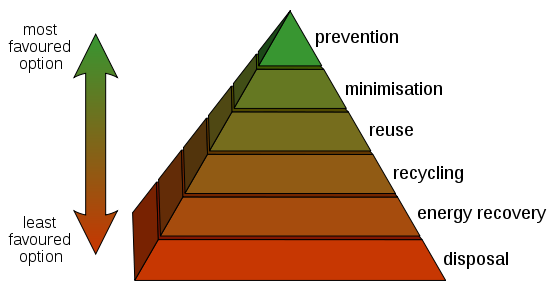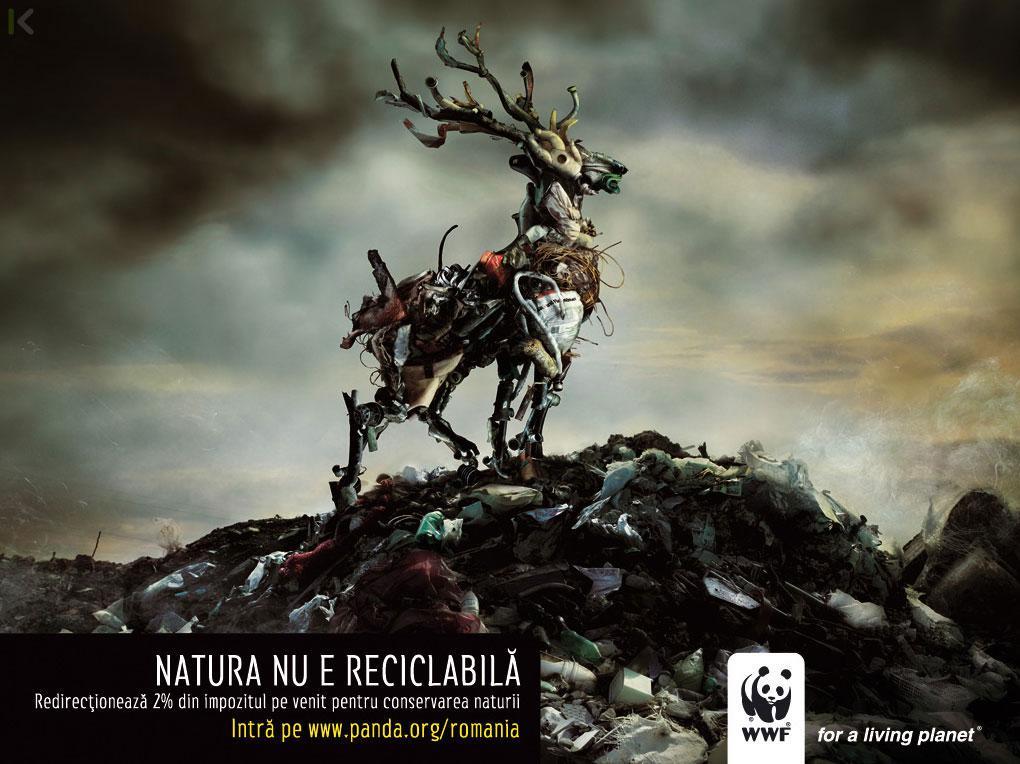Recycling doesn't make the world a better place; it marginally reduces the harm caused by the corporations serving contemporary, high-consumption, high material-throughput lifestyles.
[](https://cdn.ecohustler.com/media/2019/03/19/recycling-4.jpg)Let's follow a recycled item on its journey. We enjoy draining a wine bottle and then carefully line it up with cans and plastic for the collection men to feed their groaning truck. Their drive-by is accompanied by a mighty crash as the bottles are flung aboard, disturbing us, and not just because of the noise. Subliminally we are reminded that something of value is being destroyed. The wine bottle, like the shaped tin, has value because a high-energy manufacturing process has pulled raw materials into a highly organised and useful state. That these things still have value is absolutely clear if you spend time in a poor country where they will become trusted items of homeware. 
The Waste hierarchy
A well-established hierarchy of the treatment of waste tells us that reusing a material is always preferable to recycling it and yet there are two tiers above reuse: prevention and minimisation. In rich countries, arcane economics specialising in socialising costs and boosting private profits means that an extensive network of government-sponsored waste transport and processing has been normalised stalling progress midway up the pyramid.
SUPPORTED BY HEROES LIKE YOU
Support independent eco journalism that drives real change.The consumer is urged, cajoled and guilt-tripped into sorting waste and thus becomes part of a convoluted industrial process that stretches from the extractive mines of distant lands through the factories of China to our homes... and then back again.[](https://cdn.ecohustler.com/media/2019/03/19/17892-Happy-Recyclers-Jupiterimages.jpg)

Be a family of good consumer monkeys and recycle (barf)
[](https://cdn.ecohustler.com/media/2019/03/19/recyclebusinesscards-p240018405380694808bfd0z_400.jpg)The corporations profiting from these elaborate flows of material have the resources available to instigate a step change. Supermarkets could provide shoppers with reusable containers that they return to have refilled. Electronics companies could lease their technology, not sell it, and ensure that all the rare metals remain in their inventories to be reused for upgraded handsets. These well-understood and obvious progressions would cut out the energy-intensive recycling phase altogether. The problem is that this would shift the burden of responsibility from the consumer to the corporation - a burden they do not want and are well positioned to reject. Radically changing a business model has inherent risk; Xerox and Interface have blazed a trail that few dare follow. Even the "eco" brands trumpeting their "Plan A"s insist on enveloping their goods in plastic for their customers to work through rather than innovating new ways of getting product to customers.
It makes short-term sense to corporations' turnovers to outsource their waste management to us but perhaps most frustrating is that, as always, government action is obsequious before the spinning dials on the economic (doomsday) clock. Our taxes are spent by the million backing up the ruse with extensive public advertising seeking to adjust consumer behaviour to clean up the mess.
Overall, government money would be better spent pushing through the parsimonious policy principle that the polluter pays - or put another way… if you make a mess… clean it up! If companies were taxed according to the waste they produced there would suddenly be far less of it with multiple environmental and social benefits. Environmental messaging that urges us to recycle to "save the planet" or "do our bit" is actually manipulating our behaviour to sort out the packaging legacy bequeathed us from the same retail giants that have displaced the small local shops that may not have insisted on enveloping imported goods in plastic in the first place. Worse though, it diverts us from the actions and thinking that could make a real difference.
If you ask people why they don't start a compost heap, dig a wildlife pond, volunteer with local kids or do other value-boosting life activities they might respond, taking their queue from the adverts - "I already do my bit, I recycle". In doing so they reveal they don't understand recycling and they also have a pretty distorted idea of "my bit." Our contribution to shifting to a healthy, ecological society can move beyond reducing the harm caused by big, dirty and harmful self-maximising corporations and instead push the other way, towards self-reliance, healthier lifestyles and improved connection to the natural world. To do this we have to recycle recycling. It is a false solution, a transitory harm-reduction measure for inherently polluting processes.
Let's not get distracted.
 Nature can't be recycled



